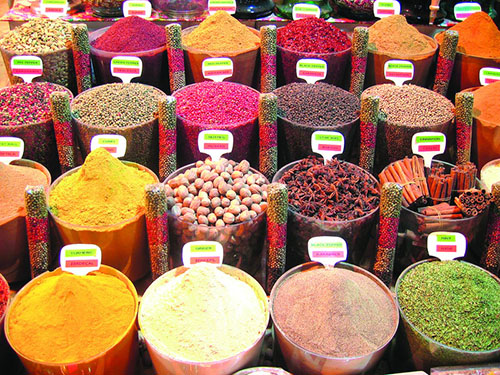
As the Food and Drug Administration attempts to lower salt (which is about 40% sodium) intake for the population, consumers will be splashed with a wake-up call about the amount of salt we really ingest. The average American takes in about 3,400 mg, or 1 ½ teaspoons, of sodium per day, a big jump from the maximal intake of 2,300 mg per day we really should be consuming. Sodium retains fluid in the body, increasing our blood pressure and burdening our hearts with that extra fluid weight. Such high consumption of sodium increases the risk of high blood pressure and stroke. Foods like potato chips, pickles, deli meats, and other processed foods are loaded with salt. Salt is an easy, cheap, and convenient way to add flavor and preserve food products, thereby making both the manufacturer and consumer attached to their beloved salt shakers. How can one concomitantly lower salt intake and infuse meals with a flavor that can contend with salt?
Replacing salt with herbs and spices can be a great solution to America’s salt addiction. Not only are herbs and spices flavorful, but they’re also chock-full of healthy benefits. For example, a half teaspoon of ground cloves has more antioxidants than half a cup of blueberries! Antioxidants help prevent O2 radicals from wreaking havoc on our bodies, lowering the amount of oxidative stress they cause to our cells. Oxidative stress is linked to aging, cancer, and other nefarious conditions.
Other spices, like turmeric (which is found in curry), may stave off disease. Research shows that India, a country where curry is as ubiquitous as Starbucks® coffee in New York City, has a lower incidence rate of Alzheimer’s Disease and Parkinson’s disease. This is possibly due to their high consumption of curry, a major part of India’s culinary repertoire. Curcumin, the pigment in turmeric that gives it its distinct yellow color, may help prevent these two devastating diseases.
Garlic is another spice that can help in reducing cholesterol, blood pressure, and promoting heart health. According to a study published by the Proceedings of the National Academy of Sciences, consuming garlic helps boost our natural supply of hydrogen sulfide. Too much of it is toxic; however, in moderation, it relaxes blood vessels and boosts blood flow. It may even boost heart health, but more research needs to be done in order to be deemed conclusive.
There is a plethora of herbs and spices to experiment with in the kitchen. We can point our palates to different cultures, as their culinary practices may bring a new perspective to our cooking experience. Hungarians sprinkle paprika, Italians use oregano and basil, Mexicans cook with cilantro, and the list continues. By being more creative and open-minded, we can create wonders in the kitchen and improve our health with a pinch and a sprinkle.
By Melissa Papir Kolb RD













